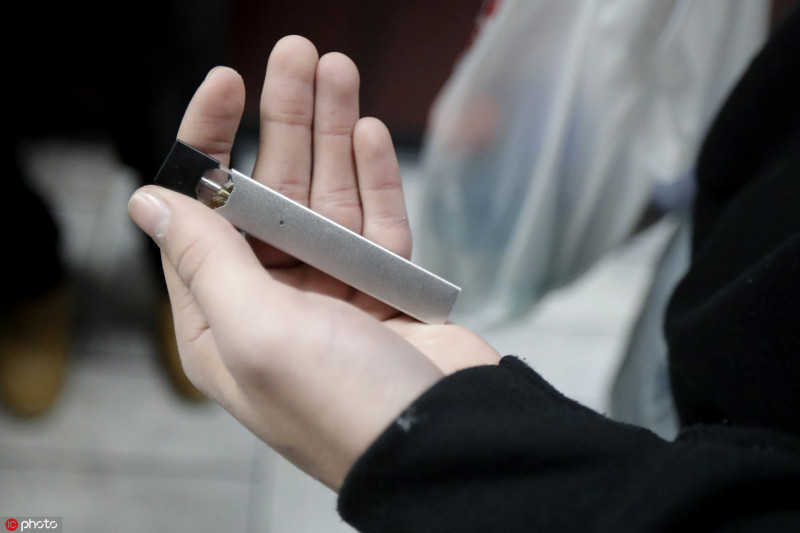Congress to hold hearing on e-cigarettes


Congress will hold a hearing Tuesday about an outbreak of vaping-associated lung illnesses from the use of e-cigarette products, as US health officials have identified more than 500 confirmed and probable cases in 38 states.
The House Oversight's Subcommittee on Economic and Consumer Policy will hear from officials of the Food and Drug Administration (FDA) and the Centers for Disease Control and Prevention (CDC).
The committee also has been investigating whether San Francisco-based Juul Lab – the industry leader with a 75 percent share of the market – deliberately targeted children with flavored vaping products.
The FDA's tobacco division on Sept 19 launched a criminal investigation into the nationwide epidemic of vaping-related illnesses after the number of cases spiked last week to 530 in 38 states and one US territory, up from 380 a week ago.
An eighth death due to vaping-related illness was reported Sept 19 when the Missouri Department of Health confirmed a man in his 40s died.
Mitch Zeller, the FDA's tobacco director, said the agency isn't interested in prosecuting individuals who use illegal products in vaping. He said it wants to uncover the chemical makeup of vape products and how they are being used in ways that may make people ill.
"We are in desperate need of facts," Zeller said, adding that the focus is to identify what is making people sick as well as the supply chain.
Most patients report using THC, the compound in marijuana that produces a high. Some have used both nicotine and THC, while other patients say they vaped only nicotine.
Meanwhile, Walmart, the world's largest retailer, said in an internal memo that it will stop selling e-cigarettes in its Walmart and Sam's Club locations in the US amid "regulatory complexity" and "uncertainty" surrounding the industry, The Wall Street Journal reported Saturday.
Tony Abboud, executive director of the Vapor Technology Association, a lobbying group for the e-cigarette industry, said it was a mistake for Walmart to reduce access to vaping products while selling cigarettes.
"This will drive former adult smokers to purchase more cigarettes," Abboud said.
Other US retailers have stopped selling vaping products, with the most recent ones being the Rite Aid drug chain, Dollar General, one of the fastest-growing retailers in rural parts of the country, and Costco, which operates a chain of membership-only warehouse clubs.
TV networks CNN and CBS said on Sept 18 that they would stop airing advertisements by e-cigarette companies on their networks.
The e-cigarette industry has spent $57 million on TV ads this year, according to iSpot.tv, a company that tracks commercials.
Juul has spent the most, more than $30 million on TV commercials as of last week, with almost 9,100 national ad airings, according to iSpot.
New York and Michigan have banned the sale of most flavored e-cigarettes, and some countries have banned all e-cigarette products, saying they pose too much of a health risk.
But those who oppose a ban— from sellers to users — say it will force former cigarette smokers to return to their old habit or have e-cigarette smokers turn to a black market that officials say is growing for illicit cannabis-vaping products.
The Journal reported that the market for illicit vaping products is thriving online, including on Facebook Inc's Marketplace, where it said sellers offer vaping products containing THC, the mind-altering ingredient in cannabis.
In the US, federal regulators said they will soon ban flavored e-cigarettes. CNN reported Sunday that uncertainty surrounding vaping in the US has spurred stockpiling among users afraid of returning to cigarettes.
Gregory Conley, president of the American Vaping Association, a nonprofit advocacy group, commended them.
"It's a moral imperative to disobey unethical laws, and they're going to fight and not relapse back to smoking," he told CNN. "These are the type of hardcore former smokers who if they can't access nicotine in a way that they enjoy, they are heavily at risk to going back to smoking."
On Sept 18, India banned the sale of electronic cigarettes. The ban doesn't forbid people to smoke them but covers the production, import and advertising of e-cigarettes.
The Associated Press and Reuters contributed to this story.































